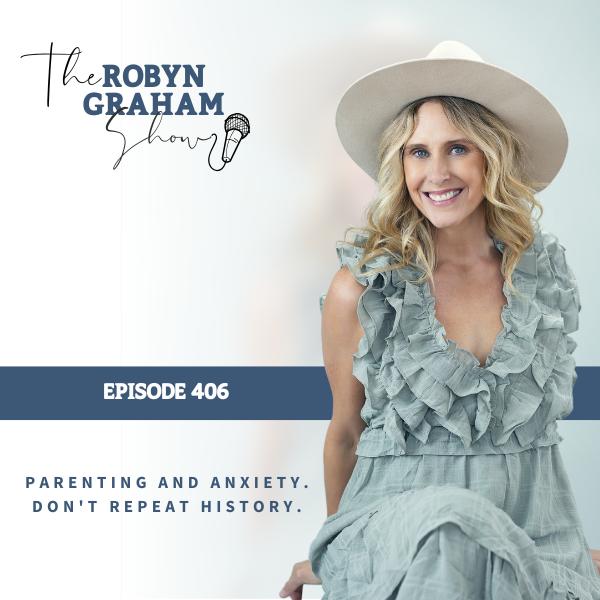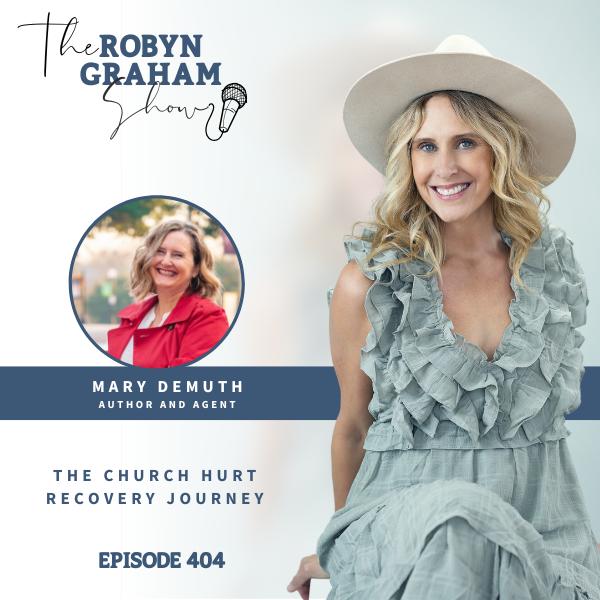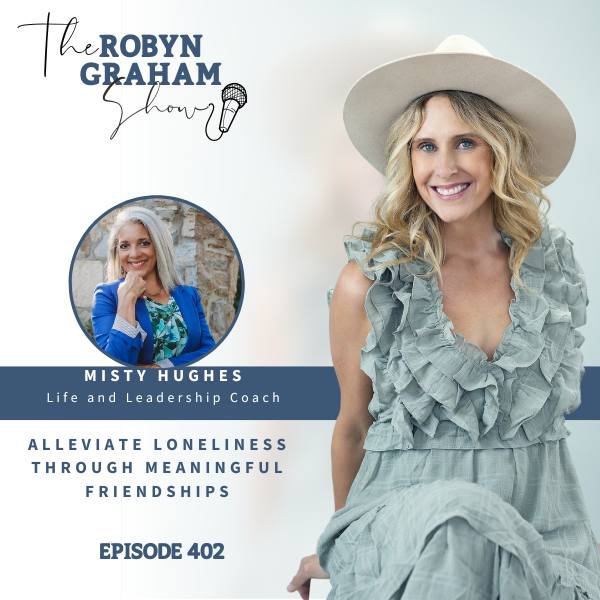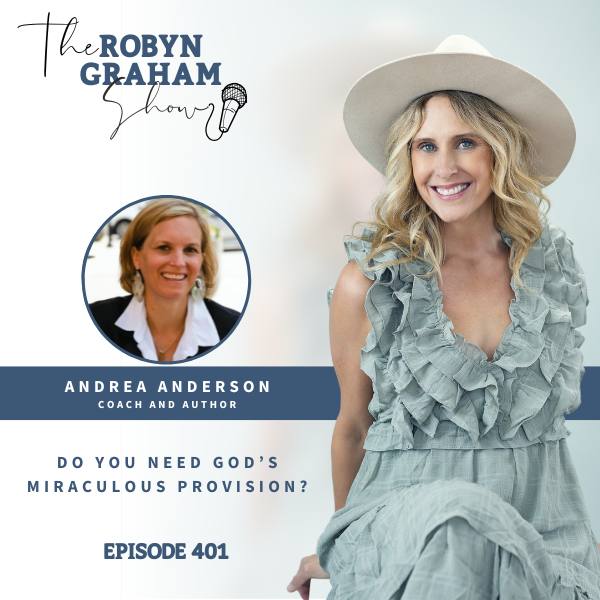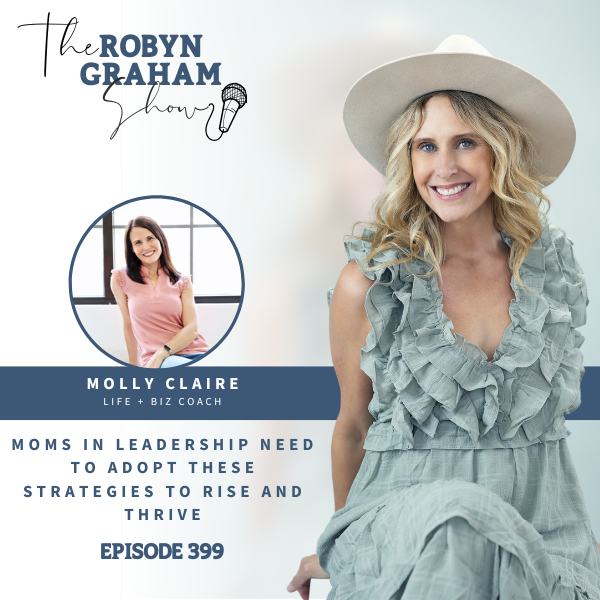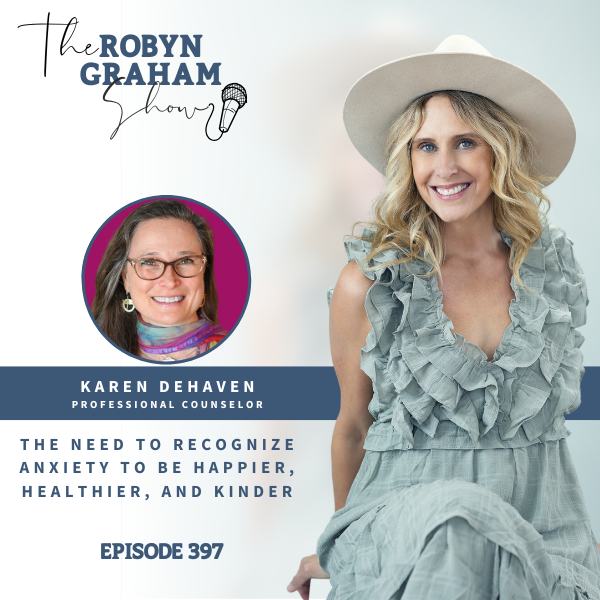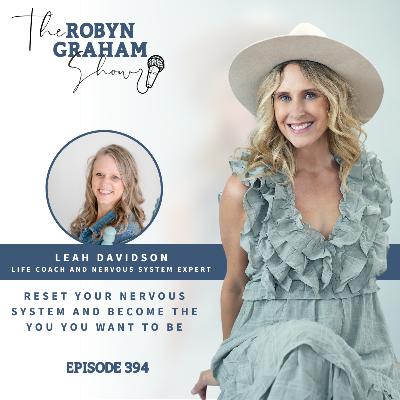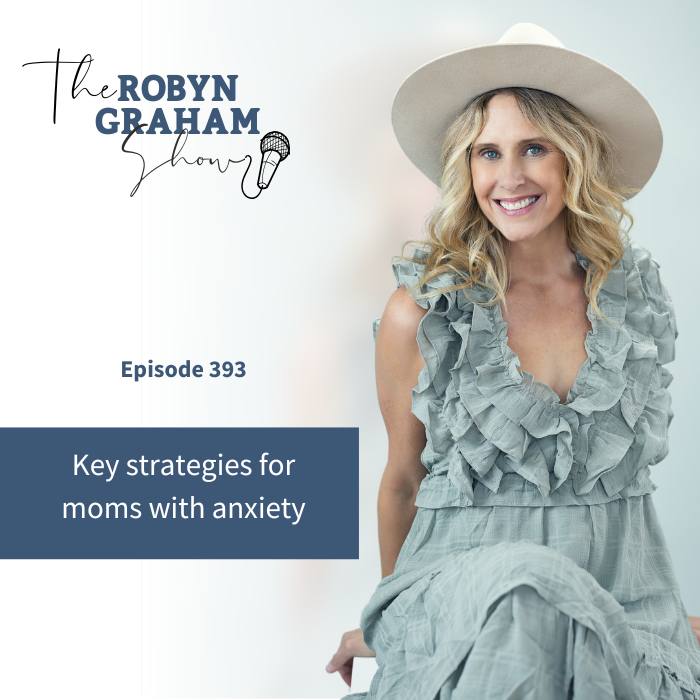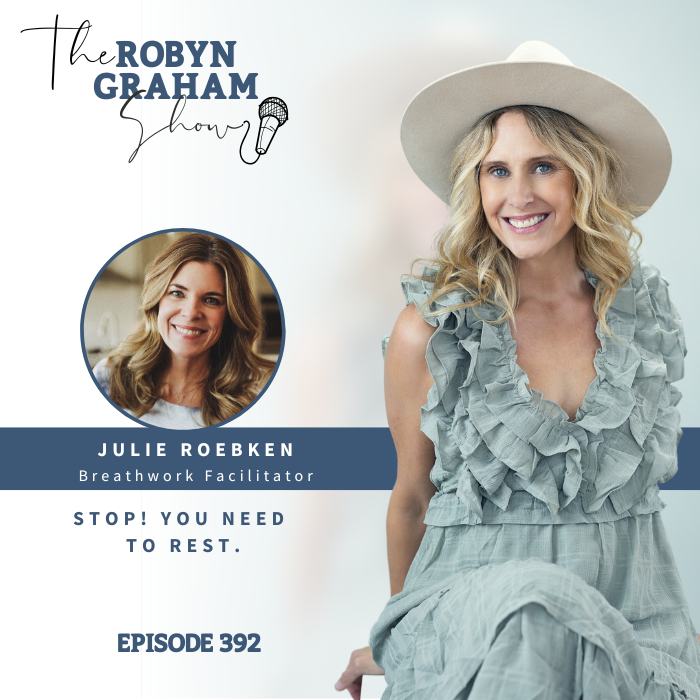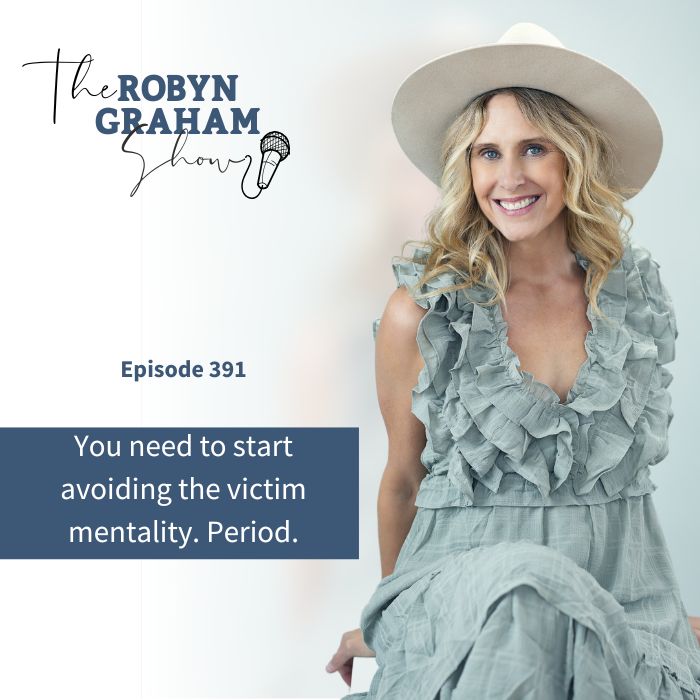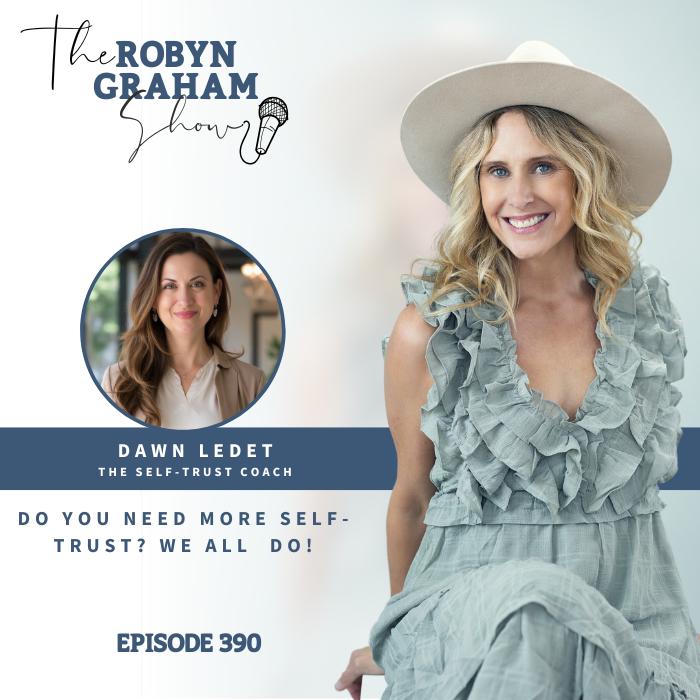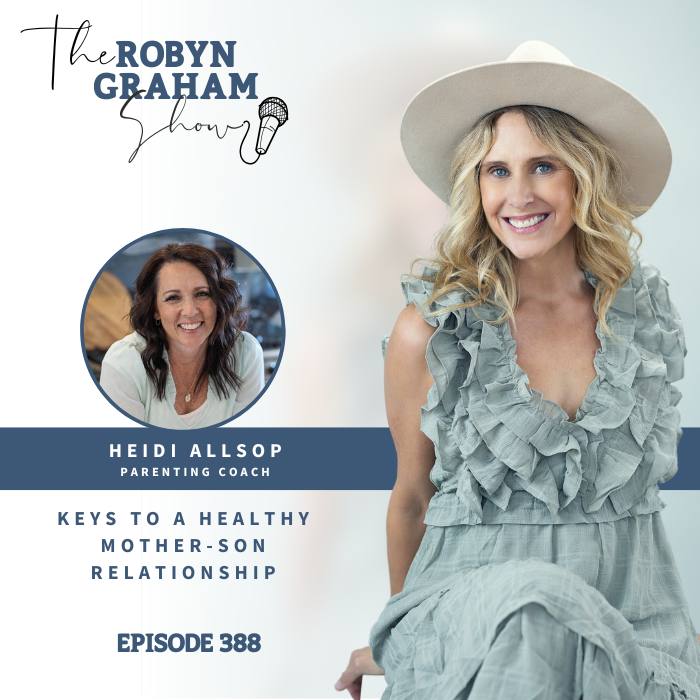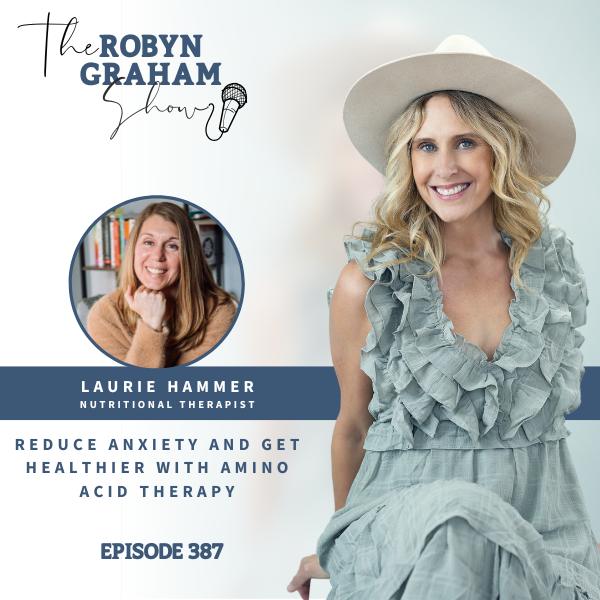Discover The Robyn Graham Show - Helping Christian Moms Become Calm, Confident, and Content Despite Anxiety
The Robyn Graham Show - Helping Christian Moms Become Calm, Confident, and Content Despite Anxiety

The Robyn Graham Show - Helping Christian Moms Become Calm, Confident, and Content Despite Anxiety
Author: Dr. Robyn Graham, Parenting Coach for Women in Leadership | Author
Subscribed: 17Played: 371Subscribe
Share
© copyright Robyn Graham
Description
Welcome to The Robyn Graham Show . . .
A top 1% globally ranked podcast for Christian women in leadership. Through solo episodes and guest interviews we will share strategies to help you navigate life with anxiety and alleviate emotional chaos so that you can maximize your potential in all areas of your life and discover clarity, confidence, and contentment.
.
I understand how overwhelming and frustrating life can be at times. And that when one area of your life is out of balance other areas are teetering too.
I'm Robyn Graham, your host and a parenting coach for women in leadership. As a former pharmacist and former business consultant, and a high-achieving woman who is also a mom to two adult sons and a teenage daughter, I've experienced life with anxiety and emotional chaos, and that is why I became a certified solution-focused, neuroscience coach - to help you navigate it too!
Past episodes include a depth of content on business growth strategies, faith, and mindset. Now, you'll experience more topics related to parenting, health and wellness, relationships, faith, mindset, and overall well-being.
I and my guests will share practical advice and experiences to help you live a thriving, healthy life with your family and in your leadership roles.
Subscribe for new content every week!
And be sure and visit therobyngraham.com/resources to download a free resource to help you navigate anxiety and develop healthy habits for a healthy mind.
Now for the good stuff! Grab your cup of coffee, the car keys, or the dog's leash, and let's dive in.
Email us: theteam@therobyngraham.com
Connect with Robyn:
LinkedIn - https://linkedin.com/in/therobyngraham
Instagram – https://Instagram.com/therobyngraham
YouTube - https://www.youtube.com/channel/UCwNrxK-44J7YVbM7THDOVJA
You, Me, and Anxiety: www.youmeandanxiety.com
Apply to be a guest
If you feel you can add value to our listeners to help them maximize their potential as a mom and women in leadership, apply to be a guest (no email pitches) at: https://www.therobyngraham.com/podcast
A top 1% globally ranked podcast for Christian women in leadership. Through solo episodes and guest interviews we will share strategies to help you navigate life with anxiety and alleviate emotional chaos so that you can maximize your potential in all areas of your life and discover clarity, confidence, and contentment.
.
I understand how overwhelming and frustrating life can be at times. And that when one area of your life is out of balance other areas are teetering too.
I'm Robyn Graham, your host and a parenting coach for women in leadership. As a former pharmacist and former business consultant, and a high-achieving woman who is also a mom to two adult sons and a teenage daughter, I've experienced life with anxiety and emotional chaos, and that is why I became a certified solution-focused, neuroscience coach - to help you navigate it too!
Past episodes include a depth of content on business growth strategies, faith, and mindset. Now, you'll experience more topics related to parenting, health and wellness, relationships, faith, mindset, and overall well-being.
I and my guests will share practical advice and experiences to help you live a thriving, healthy life with your family and in your leadership roles.
Subscribe for new content every week!
And be sure and visit therobyngraham.com/resources to download a free resource to help you navigate anxiety and develop healthy habits for a healthy mind.
Now for the good stuff! Grab your cup of coffee, the car keys, or the dog's leash, and let's dive in.
Email us: theteam@therobyngraham.com
Connect with Robyn:
LinkedIn - https://linkedin.com/in/therobyngraham
Instagram – https://Instagram.com/therobyngraham
YouTube - https://www.youtube.com/channel/UCwNrxK-44J7YVbM7THDOVJA
You, Me, and Anxiety: www.youmeandanxiety.com
Apply to be a guest
If you feel you can add value to our listeners to help them maximize their potential as a mom and women in leadership, apply to be a guest (no email pitches) at: https://www.therobyngraham.com/podcast
415 Episodes
Reverse
If allowed, history will repeat itself. And that is why healing from the past is crucial, especially when parenting and anxiety are hand in hand. More than 40% of Americans have an anxiety disorder. Even more alarming, 32% of adolescents between the ages of 13 and 18 have an anxiety disorder. With such profound statistics, there is no doubt that parenting and anxiety need to be addressed collectively. Don't repeat history. You may have heard the phrase hurt people hurt people. And this is especially true if one does not heal from the past. This may be true for parents and can be made worse when anxiety is present. Hurt can be inflicted intentionally or unintentionally, but without healing, hurt passes from one generation to the next. Lisa Brenninkmeyer said, "Suffering not transformed is transmitted. Satan wants us to say I was wounded, now I will wound." Her quote seems to be directed more at the person who intentionally hurts others, but the reality is that if we do not transform our suffering, we ultimately hurt others, no matter what. And, we continue to hurt ourselves. The word suffering may feel a little extreme when it comes to anxiety. However, anxiety can be debilitating and can lead to outbursts of anger due to irritability and an inability to cope. When this happens, the people in the path of the anxious person get hurt. And when that happens — once or repeatedly — suffering ensues and builds. Relationships are often damaged and maybe, over time, even destroyed. For parents, it is crucial to heal from past wounds and navigate anxiety in order not to bring past hurt into our parenting. Heal to avoid parenting and anxiety traps? Any time there are unhealed wounds, there is a risk of increased anxiety. Oftentimes, when people are wounded, they are angry and have not taken the initiative to forgive. Unforgiveness can cause an increase in anxiety. We know that God calls us to forgive. If you have someone you need to forgive, pray about it. That sounds simple, but the Lord can and will soften your heart. It is important to note that granting forgiveness does not mean you will forget the hurt caused by someone else. But you can forgive and set boundaries so the hurt doesn't continue. When we've been hurt, we may be tempted to harden our hearts. Instead, we can harden our exterior by establishing boundaries while softening our hearts to allow for forgiveness, love, and compassion without holding onto past hurts. Once we make this effort and continue to pray for the Holy Spirit's guidance and strength, we will see transformation. With transformation, anxiety will decrease. You will be less likely to overreact when someone, like your child, spouse, or even your parent, aggravates you or reminds you of a past wound. Read the full show notes and access all links. To start a journaling practice, download the free eBook, 15 Journaling Prompts and Scripture Verses, today! Schedule a discovery call with Robyn and start your healing journey today!
As women, especially Moms, we have life experiences that have formed us. Our struggles and triumphs become a message to share to inspire others. In a world where we continuously seek ways to make a difference, the power of sharing our experiences and insights has never been more crucial. Whether you're driven by a sense of purpose or a desire to impact others positively, speaking can be a transformative tool in your journey. Unfortunately, many individuals feel a calling to share their message, but are often held back by uncertainty and self-doubt. However, if you have an impactful message, we want to help you start speaking today to share your story and make a difference. Your Unique Message to Share Everyone has a story or perspective that deserves to be shared. It's common to compare our stories to others, wondering if they are significant enough. Remember, what seems ordinary to you might be life-changing for others. The value of your message lies in its authenticity and relatability, not in pomp or spectacle. Embrace this reality and step forward to share what makes your journey unique. Start Speaking: Find Your Focus If you want to start speaking, clarity is your friend. Begin by defining what you want to be known for—your speaker statement. This involves identifying who you can help and how your speaking can facilitate that transformation. Specificity in your message enables you to connect with the right audience. Rather than trying to cover numerous topics, focus on one area where your insights can have the most significant impact. Overcoming the Fear of Speaking For many, anxiety and fear are significant hurdles to becoming a speaker. Shifting from seeing public speaking as a performance to viewing it as a service can make a huge difference. By focusing less on yourself and more on the needs of your audience, the pressure to be perfect diminishes. Think of yourself as a lighthouse, guiding others with your insights, instead of a spotlight, seeking validation. Read the full show notes and access all links.
Healing from church hurt is a journey worth embarking on. In the realm of spiritual communities, few topics are as sensitive or impactful as church hurt. This phenomenon affects individuals across various denominations and can profoundly influence one's faith journey. Understanding and healing from church hurt is essential for maintaining and rebuilding a healthy relationship with Jesus. Understanding Church Hurt Church hurt stems from negative experiences within religious settings, such as emotional turmoil, spiritual abuse, or feeling ostracized. It does not discriminate among denominations; it can happen anywhere and to anyone. Recognizing this is crucial to navigating the complicated emotions involved and finding ways to heal. Navigating the Path to Healing Healing from church hurt often involves acknowledging the pain and finding supportive environments to express it. Talking with trusted individuals who understand or have experienced similar struggles can be invaluable. Recovery is not about finding an immediate solution but about gradually rebuilding trust and faith. Utilizing Resources for Support Tools and resources can offer guidance in recognizing and addressing hurt resulting from others in the church community. Such resources help individuals identify red flags and articulate their feelings. Seeking external perspectives can shed light on situations and clarify if certain behaviors are problematic or dismissive in religious contexts. Embracing Hope and Finding New Community While healing from the hurt of individuals within church organizations, it is vital not to generalize all religious communities based on one experience. Positive, nurturing faith communities do exist, and taking the time to find them can offer renewed faith and fellowship. Remember, it's about finding a place that reinforces spiritual well-being and growth. Read the full show notes and access all links. Website for Mary DeMuth Additional resources you will find helpful: Mary DeMuth - You Need to Meet These Women of the Bible (They Are Just Like Us) - Episode 398 Rebecca George - Ditch the prosperity gospel. Trust God's Timing. Episode 381 Download the free eBook: 15 Journaling Prompts and Scripture Verses
Even adult children need their parents. But when things get rocky, how can you improve relationships with adult children? In the evolving world of parenthood, maintaining a strong bond with adult children presents unique challenges. As children transition into adulthood, the dynamics shift, often leading to confusion for parents. However, with understanding and a strategic approach, it's possible to improve relationships with adult children and cultivate a healthy, fulfilling family connection. Understanding the Shift in Dynamics Once children turn 18, they are legally considered adults. This milestone often surprises parents who feel uncertain about their new role. As children grow into their independence, they become increasingly determined to make their own choices, sometimes clashing with their parents' ideals. This can lead to emotional chaos and strained relationships. However, understanding these dynamics is the first step to improving relationships with adult children. The Importance of Self-Connection For mothers, connecting with themselves is paramount. As the cornerstone of the family, maintaining inner peace is essential. By prioritizing self-awareness, moms can better navigate the emotional upheavals that come with parenting adult children. Self-care and inner reflection act as the glue that binds the family, providing stability during times of change. Listening and Validating Emotions Open communication is essential for improving relationships with adult children. It is necessary to engage in active listening, validate the emotions of your children, and initiate a dialogue about their feelings and experiences. By acknowledging their perspectives, parents can build a stronger, more respectful relationship. The Role of Faith-Based Strategies For those who treasure faith, integrating it into your parenting approach can help mend and strengthen familial ties. By relying on spiritual guidance, parents can find peace in surrendering their worries and trusting a higher power with their children's paths. This can lead to healing and transformation within the family unit. Read the full show notes and access all links. Website for Kim Damon Additional Resources Reset Your Nervous System and Become the YOU you want to be - Episode 394 - https://therobyngraham.com/reset-your-nervous-system/ You Need to Start Avoiding the Victim Mentality. Period. - Episode 391 - https://therobyngraham.com/victim-mentality/ Purchase You, Me, and Anxiety: Take Action Over Anxiety to Enjoy Being You Teen edition Parent edition
There is a solution for the loneliness epidemic. In our increasingly isolated society, establishing meaningful friendships can be a critical step in alleviating the pervasive feeling of loneliness. While life transitions, such as moving to a new area or changing jobs, can disrupt established connections, they also provide opportunities to cultivate new relationships that align with our values. Developing these friendships requires time, effort, and intentionality. The Importance of Meaningful Friendships In light of today's epidemic of loneliness, which affects many despite the facade of being well-connected digitally, nurturing meaningful friendships is vital. These friendships are not merely social interactions; they are pivotal to our emotional health and well-being. True friends provide support, joy, and alignment with our values, which are essential for maintaining a stable and happy life. The Journey to Building Friendships Building meaningful friendships is a journey. It is not just about logging 200 hours with someone to establish a connection. It's about engaging in experiences, conversations, and activities that forge deep, meaningful bonds. This journey involves vulnerability, openness, and an eagerness to discover potential friends in settings such as church groups, sports clubs, or book clubs. Overcoming Barriers in Friendship Despite a busy lifestyle or fears of rejection, it's crucial to break down barriers that impede the development of friendships. Many are afraid to reach out, fearing interruption or rejection. However, these barriers can be overcome by simple actions, such as initiating conversations, setting up coffee dates, or sharing a simple gesture of appreciation. Fostering Friendships Across Different Life Stages Friendships evolve over time and across life stages. Whether you are a young mom or someone who transitions through different life phases, recognizing the need for friendships at each stage is crucial. Groups like playgroups or community activities can be excellent ways to introduce new friends who share common values and interests. Read the full show notes and access all links. Additional Resources Finding Your Superpowers: leaning into personal values & dropping comparison - Episode 339 The solution to emotional isolation - Episode 209 Website for Misty Hughes
God's miraculous provision will see us through all aspects of life. In our journey through life, many of us face struggles that seem overwhelming, whether it's anxiety, parenting challenges, or simply navigating daily life. In these moments, seeking God's miraculous provision can become a beacon of hope and guidance, helping us to rise and thrive. Understanding God's Miraculous Provision God's provision isn't always about grand gestures. It's often about the everyday miracles that help us navigate life's storms. Recognizing these provisions requires trust and faith. Andrea Anderson's book, "Bread Like Rain," delves into encountering God's provision in daily life, offering practical insights for those feeling stuck. Strategies to Rise and Thrive One key strategy for rising and thriving in life is recognizing that control doesn't always serve us. Attempts to micromanage life can lead to increased anxiety. By turning to God and releasing control, we open ourselves to His guidance. This spiritual surrender is often where God's miraculous provision begins. As we learn to trust in God's plan, we discover strength and direction that lead us toward harmony and peace. Trusting in Daily Provision Becoming Vessels of Provision Website for Andrea Anderson. Order Bread Like Rain today. Read the full show notes. Download the free eBook, 15 Journaling Prompts and Scripture Verses.
Can Christians and anxiety go hand in hand? The answer is a resounding yes. Christians and anxiety often go hand in hand. Not because of a lack of faith, but because we live in a broken world in which many things can impact mental, physical, and spiritual health. 400th Episode Friends, I cannot believe this is the 400th episode. When I set out to start the podcast five and a half years ago, I thought I'd share stories of women and men reinventing themselves as entrepreneurs and starting their second phase. My idea quickly morphed into something more. Not only did I want to inspire others to follow their values, visions, and passions and discover a purpose greater than themselves, but I also wanted to help guide them in this pursuit. Because so much of my focus was on building a business, naturally, the content we created became more about business growth advice and stories of success. We added small doses of faith, mental health, mindset, and wellness to round out the content. As I was thinking about what to do in celebration of this episode, because I think it is a big deal to make it this far, someone sent me an email. The email was in response to an email I sent about using journaling as a tool to navigate anxiety. It read: I don't get anxiety, period, if one is of faith in Jesus Christ! Goodbye. The old me would have quickly hit return and tried to convince him that having faith doesn't mean you will never have anxiety. But instead, I thought, 'No, he said goodbye, which made me chuckle; let him go.' People like him cannot be convinced, and it isn't my job to change his perspective. Instead, I decided to take advantage of his lack of understanding to create content that could help many. The combination of Christians and anxiety does not have to cause shame. A perspective like his can cause a person who loves Jesus to feel shame over experiencing anxiety. No one needs an additional reason to feel shame. Living life as a human can result in enough shame, especially when experiencing brain health challenges. I wonder, as I'm writing this, what your thoughts are? Can one be a Christian and have anxiety? My thoughts are that as humans, we are not perfect. We are subject to human dysfunctions mentally, physically, and spiritually. Christians get diabetes. They get cancer, heart disease, autoimmune diseases, and neurological diseases. And yes, Christians experience mental health challenges too. We are not divine; therefore, we can be afflicted by ailments, illnesses, and diseases. To judge a Christian because they have a disease or ailment is simply unkind and results in shame. The key, for Christians and everyone, is to lean into Christ and our faith to navigate anxiety. When we put all of our trust in earthly solutions, we risk idolatry and anxiety rising. Proverbs 17:3 reminds us, "The crucible is for silver, and the furnace is for gold, and the Lord tries hearts." As heat refines gold and silver, God purifies us through challenging experiences such as anxiety and emotional chaos in our lives and relationships. Having anxiety isn't a punishment. If we choose, we can use it as a way to grow closer to God and allow Him to sanctify and purify us. Read the full show notes and access all links. Download 15 Journaling Prompts and Scripture Verses Download the free eBook: Alleviate Anxiety by Developing Healthy Habits for a Healthy Mind.
Wholeness over hustle: a movement that embodies strategies to rise and thrive as women and as mothers. In today's bustling world, women, especially mothers, are navigating the dual roles of leading both at work and at home. Understanding the intricacies of this journey is vital for thriving in every aspect of life. We all need strategies to rise and thrive, focusing on maintaining wholeness over hustle while embodying leadership. Wholeness Over Hustle Our society often equates success with relentless hustle. However, Molly Claire emphasizes the importance of wholeness—creating a life of balance rather than burning out. By focusing on core values and aligning your goals with what's truly important, you redefine success. Wholeness involves nurturing yourself emotionally and mentally, ensuring you lead effectively while maintaining personal well-being. The Four Fundamentals of Lasting Change Mind mastery, emotional resilience, nervous system regulation, and action-focused strategies are the four fundamentals of lasting change. These foundational elements ensure sustainable change. By mastering your mind and emotions, you gain clarity and resilience. Regulating your nervous system helps maintain calm and focus, enabling you to act strategically rather than reactively. Read the full show notes and access all links. Visit Molly Claire's Website Join the waitlist for Molly's new book and be the first to know when it's released: She Rises. Download the Guide to Alleviate Anxiety by Developing Healthy Habits for a Healthy Mind Additional Resources You need to be aware that not all thought work strategies are healthy - Episode 355 Finding Your Superpowers: leaning into personal values & dropping comparison - Episode 339 Reset Your Nervous System and Become the YOU You Want to Be - Episode 394
A journey through the remarkable stories of women of the Bible. Most, if not all, women of the Bible lived extraordinary lives, overcame immense challenges, and set examples that resonate with us today. Whether you're a leader, a mother, or someone simply making her way through life's hurdles, these women have much to teach us. Discovering Strength in Women of the Bible Many of us feel misunderstood and overwhelmed at times, much like the women of the Bible did. Historical accounts show us that they faced challenges similar to our own. For instance, women from the Bible, such as Ruth and Esther, exemplify strength and leadership. They navigated complex societal roles and responsibilities, much like we do today. Their resilience and faith offer lessons in hope and determination as we pursue our own life goals. The Journey of Mary DeMuth in Exploring Women of the Bible Author Mary DeMuth sheds light on the often-overlooked women of the Bible. Through her spiritual journey and writing, Mary offers insights into the lives of these women and how their stories relate to our modern experiences. Her exploration began with noticing these figures in the scriptures, sparking her series of books that reimagines their stories. These narratives not only recount history but also relate it to our current societal dynamics. The Proverbs 31 Woman and Modern Womanhood A particularly inspiring figure is the Proverbs 31 woman. Her traits—virtuous, industrious, and compassionate—reflect the qualities we aspire to embody today. Mary DeMuth reminds us that these traits were exhibited throughout her lifetime, not in the span of a single day. It's important to remember that life's journey takes time and unfolds over years, offering us a model of grace and patience. Learning from Women of the Bible in Leadership Mary DeMuth highlights women like the biblical widow, who demonstrated profound influence through simple acts of faith. Though not widely recognized, their subtle contributions emphasize the importance of humility and perseverance. For women in leadership, these stories serve as reminders that actual influence often comes quietly, without fanfare, yet with a significant impact. Read the full show notes and access additional links. Website for Mary DeMuth An additional resource related to women of the Bible: The story of Deborah – Uncommon courage you need to succeed - Episode 363 Ready to transform your mindset, achieve more goals, develop stronger relationships with your children, and/or achieve more success in your career? Schedule a discovery call and learn if neuroscience coaching is a good fit for you. Access Robyn's calendar.
When you recognize anxiety, you can navigate it and transform your life from emotional chaos to joy, peace, and purpose. In today's complex world, understanding our mental health is crucial. Feeling anxious or overwhelmed is common, but managing these emotions leads to a happier, healthier, and kinder life. The first step in this transformative journey is to recognize anxiety. Recognize Anxiety for Mental Wellness To truly address anxiety, we must first recognize it. When we bring awareness to our feelings, we can identify triggers and decide how to respond. Often, we operate in a reactive state, which can result in unkind actions towards ourselves and others. Recognizing anxiety helps shift from automatic reactions to thoughtful actions. The Importance of Allowing Feelings Recognizing anxiety is only part of the solution. Allowing yourself to experience these feelings without judgment is crucial. By simply acknowledging anxiety, you reduce its power. Accept it as a temporary state rather than a definition of who you are. Investigate the Roots of Anxiety Once you've recognized and allowed the anxiety, delve into understanding its origins. Ask yourself when these feelings arise and in what situations they are most intense. This investigation is central to therapy and helps uncover the links between past experiences and current emotions. Nourish and Empower Yourself After identifying the source of your anxiety, it's time to nurture yourself. Simple actions, such as breathing exercises, doodling, or engaging in creative activities, can significantly reduce anxiety. These practices foster a calmer state of mind and promote more kind interactions. There are many ways to regulate and reset your nervous system to reduce anxiety. Read the full show notes and access all links. Website for Karen DeHaven Additional Resources to Help Navigate Anxiety Using Faith to Navigate Anxiety Caused by Social Media - Episode 376 Navigate Anxiety to Become a Speaker - Episode 370 What do you do when you feel anxiety? Cast your anxiety on Him - Episode 329 Reduce anxiety and get healthier with Amino Acid Therapy - Episode 387 Begin your journey to navigate anxiety by downloading the free eBook: A Guide To Alleviating Anxiety by Developing Health Habits for a Healthy Mind. Book reference: Radical Compassion by Tara Brach
Anxiety and women have gone hand in hand for many years. And the prevalence has never been higher. Women and anxiety are often used in the same sentence. But most don't recognize the root of anxiety, nor the influence it has on day-to-day life, especially as mothers and women in leadership roles. What is anxiety? Anxiety is an abnormal sense of apprehension and fear that is often marked by physical signs and symptoms. When someone is anxious, they doubt that they will be able to cope with a situation or person. Doubt often leads to overreacting and emotional chaos. Overreacting disrupts stability within the family and influences the emotional state of others. Frequently, anxiety creates a vicious cycle. Prevalence of anxiety Forty-two point five million Americans claim to suffer from anxiety. The prevalence is higher in women than in men. The statistics are staggering. Breakdown of the relationships between women and anxiety I see three types of women in my coaching practice. The Worn-Out Warrior The Hidden Hurting Helper The Anxiously Awaiting Answers Read the full show notes and access all links and additional information. Schedule a discovery call with Robyn and determine if coaching is for you. Download the free eBook: A Guide to Alleviate Anxiety by Developing Healthy Habits for a Healthy Mind
When neurodiverse students are prepared, their college experience will be more successful and peaceful, and they will thrive. Navigating the transition to college can be a unique challenge for neurodiverse students and their families. Preparing both parents and students for this journey can make all the difference. Understanding Neurodiversity Neurodiversity acknowledges that every brain works differently, a natural human variation. Conditions like ADHD, autism, and anxiety fall under this category, demanding tailored support. Neurodiverse students, bright in their own right, often process information at unique speeds and benefit from specific learning strategies. The Importance of Advocacy and Support Parents must become staunch advocates for their neurodiverse students. Explore college resources like counseling and disability services. Actively seek out accommodations for students - provide detailed IEP or 504 plans. The more specific, the better. In addition, universities often offer free psychological counseling and support groups for neurodiverse students. Ensure your child is aware of the resources available to them and encourage them to use them. This proactive approach can significantly impact your child's success and help them thrive. Creating a Structured Environment At home or on campus, establish a dedicated study space to minimize distractions and promote focus. Encourage the use of tools like white noise machines, noise-canceling headphones, and calendars. Assist in scheduling academic and leisure activities, emphasizing balance between work and self-care. Physical movement is crucial—encourage activities in campus gyms or outdoor exercises. Transition Strategies for Parents Parents should assist with campus and online technology walkthroughs to become familiar with the systems they will be using for school. Another strategy to help neurodiverse students is to create a personalized "all about me" letter for instructors. Doing so will help manage professor expectations without stress. Consistent parental involvement and understanding can ease the transition and foster independence. Empowering Neurodiverse Success A little preparation can transform the college experience for neurodiverse students. By advocating, preparing, and supporting your child, you are setting them up for a successful transition. Engage with their journey every step of the way. The right strategies can ensure that neurodiverse students thrive in their college environment. Specific for moms Moms, it is imperative that you work to regulate your nervous system to provide adequate responses and don't overreact when your child is in need. The transition to college can be stressful and emotional, and your children will need your support. The calmer you are, the less emotional chaos you will experience with your child. Dani Taylor, a neurodiversity specialist, can be reached at Dani.taylor@sait.ca. For additional resources for navigating anxiety, download the free eBook: A Guide to Alleviate Anxiety by Developing Healthy Habits for a Healthy Mind.
Reset your nervous system to decrease emotional chaos in your life, career, and parenting. In a world where stress seems omnipresent, understanding and managing your nervous system can transform your life. Many of us experience overwhelming feelings and stress without realizing the root cause might be an unregulated nervous system. When you reset your nervous system, you equip yourself to handle stress, improve relationships with your children, and enhance your leadership potential. Understanding the Nervous System Your nervous system is the communication network between your brain and body, sending signals back and forth. When dysregulated, you might experience anxiety, tension, or even illness. Recognizing these signs is the first step in restoring balance. For many, symptoms may manifest as stress, tension, or worry, making it difficult to function at their best. Awareness and understanding of how your body reacts allow you to take control and make necessary adjustments. Recognizing Dysregulation Key to improving your well-being is recognizing when your nervous system is dysregulated. Symptoms appear in various forms, such as overthinking, stress, defensiveness, or even perfectionism. Your body's response, like persistent tension or discomfort, signals the need for change. By tuning into these signals, you can start to identify patterns and take proactive steps to address them. This recognition is vital for regaining a state of calm and focus. Steps to Reset Your Nervous System To reset your nervous system, focus on bringing your prefrontal cortex back online. This part of your brain, crucial for rational thinking, is often bypassed when stressed. Begin by acknowledging any tension and practicing relaxation techniques, such as deep breathing or muscle relaxation exercises. Creating a 'safety sequence'—asking yourself if you are safe, feel safe, and identifying physical reactions—can also guide you towards regulation. Implementing these techniques regularly can help shift your baseline state to one of calm and flexibility. Read the full show notes and access all links. Website for Leah Davidson Leah's Mental Health Journal on Amazon Additional Resources Download the free eBook and journal, Alleviate Anxiety by Developing Healthy Habits for a Healthy Mind. Buy You, Me, and Anxiety: Take Action Over Anxiety to Enjoy Being You Parent book. Teen book.
Parenting is hard enough. Throw in anxiety, and moms have an even bigger challenge. Moms with anxiety face additional challenges when it comes to parenting. Add in a child with anxiety, and emotional chaos will ensue faster than you can say help! So what is Mom to do? Here are a few key strategies for moms with anxiety to not only navigate the anxiety, but also create a safe and peaceful environment for your family while building thriving relationships. 1. Let go of control. 2. Set realistic expectations. 3. Communicate efficiently and often. 4. Take a break from social media. 5. Pause. 6. Heal Yourself. 7. Pray. Read the full show notes and access links to additional episodes and resources. Additional resources. If you'd like to learn more about parenting in the presence of anxiety, my book, "You, Me, and Anxiety: Take Action Over Anxiety to Enjoy Being You" - parent edition, is a fabulous resource. You will find not-to-dos, to-dos, and encouragement in addition to a plethora of scripture verses to guide you on your journey. Schedule a discovery call with Robyn.
Embrace the Power of Rest and Breathe In a world that glorifies hustle, the concept of rest often feels foreign. Rest isn't a luxury; it's a necessity for both your mental and physical health. You need to rest and breathe. Embracing rest and breath can transform your daily life, enabling you to lead and parent with vitality rather than burnout. Understanding Effective Rest When we refer to rest, it's not about idleness; it's about rejuvenation. It's crucial to reject the misconception that rest equates to laziness. Proper rest involves creating space for simplicity, silence, and sacred rhythms. This approach enables your mind and body to renew, allowing you to approach life with clarity and purpose. Regulated nervous systems and renewed minds are integral to genuine rest. These elements counteract society's push to overachieve, leading to unhealthy stress levels. To avoid unhealthy stress levels and potential future health complications, it is essential to rest and breathe. The Vital Role of Breath Breathwork serves as a powerful tool for regulating your nervous system. Proper diaphragmatic breathing helps ensure that your physiology functions optimally, promoting peace and reducing anxiety. Many people unknowingly breathe incorrectly, using shallow breaths that keep the body in a stressed state. Engage in breathwork by practicing slow, intentional breaths. These conscious breathing exercises can bring immediate calm and enhance mindful living. Incorporate Rest Daily Rest can be integrated into your life without sacrificing productivity. Consider setting aside five minutes each day for silence and solitude. During this time, focus on your breathing. Let go of societal expectations, tune into the present moment, and experience the tranquility of God's presence. Simplicity and moderation are key. Allow yourself permission to reduce clutter in both your schedule and mind. This intentional practice of slowing down fosters a refreshing sense of peace and presence. Read the full shownotes and access all links. Download the free eBook: A Guide to Alleviate Anxiety by Developing Healthy Habits for a Healthy Mind Website for Julie Roebken Additional Resources for A Healthy Lifestyle Regulate Your Nervous System - Bonus Episode. Do You Want the Easy Way to Get Healthy? Adopt God's Prescription. - Episode 386 with Chelsea Blackbird.
The victim mentality has the power to leave you hopeless and helpless. How is the victim mentality influencing your life? Have you been the victim? Are others in your life playing the victim? Where is the victim mentality holding you hostage, parenthood, relationships, career? What is it? In a nutshell, a victim mentality is when someone blames others for their life experiences. In other words, they do not take ownership of, or responsibility for their decisions and actions that resulted in unfavorable circumstances. Experiencing it. If you are the person employing a victim mentality, you are blaming others for things in your life that you are unhappy with. Blaming equates to powerlessness. When you, or others in your life, do not take ownership and consistently blame others, you sacrifice the power to change your circumstances. Additionally, a victim mentality is characterized by a lack of accountability for one's actions. Likewise, they do not adopt healthy coping mechanisms; instead, they blame others. This can be the result of trauma or past experiences, or it could be an intentional choice. Complaining is a symptom of victimhood, and people deny responsibility or ownership for their part in their circumstances. Blaming others, Satan, or God is quite common when someone chooses victimhood. Blame is the key ingredient of a victim mentality. I've recently heard an overwhelming number of people blame the devil for their current circumstances, be it relationships, financial insecurity, lack of success, emotional chaos within their families, or anxiety. When anyone gives Satan credit for their circumstances, they are rendering themselves powerless to him. Scripture verses that remind us that Satan has no authority over us: Luke 10:19 "See, I have given you authority to tread on snakes and scorpions, and over all the power of the enemy; and nothing will hurt you." 1 John 4:4 "Little children, you are from God, and have conquered them; for the one who is in you is greater than the one who is in the world." Colossians 1:13 "He has rescued us from the power of darkness and transferred us into the kingdom of his beloved Son," Romans 8:38-39 "For I am convinced that neither death, nor life, nor angels, nor rulers, nor things present, nor things to come, nor powers, nor height, nor depth, nor anything else in all creation, will be able to separate us from the love of God in Christ Jesus our Lord." Anxiety One of the first steps you can take is to download the free eBook, Alleviate Anxiety by Developing Healthy Habits for a Healthy Mind. The second step is to give yourself a social media reset and use the time you've been scrolling to get closer to Jesus. Read the full shownotes and access all links.
The level of Self-Trust you have will determine how you approach all aspects of life. If it's lacking, know that you can develop it; it's like a muscle. In the hustle and bustle of today's world, finding solace in self-trust is not just a nicety but a necessity. When navigating the challenges of being a parent, a leader, or simply trying to achieve personal goals, self-trust can enhance your decision-making capabilities. In addition, self-trust will help build overall mental resilience. Understanding Self-Trust Self-trust is often misunderstood or undervalued, a quiet yet powerful force that guides us through the maze of life's decisions. It's the foundation on which we build our capacity to make choices—even when we're plagued by uncertainty and doubt. It's not about being free of doubt but about learning to make decisions in its presence and having the confidence to follow through. Framework for Building Trust in Yourself Building self-trust doesn't happen overnight—it requires intentional action and a shift in mindset. At the heart of this transformation is a profound yet straightforward cycle: making decisions, following through, and having your own back when results come to fruition. 1. Decision-Making Each day, we make thousands of decisions without realizing it, yet we often focus on the difficult ones. Building self-trust involves recognizing that we're already capable decision-makers. By focusing on these everyday decisions, we begin to realize our strengths and the power within us, which propels us forward rather than holding us back. 2. Follow Through with Confidence Following through with our decisions is where we gain valuable insights about ourselves. This isn't about sticking rigidly to a decision. It's about learning from the consequences of our actions. Self-trust grows when we learn to trust our data, allowing ourselves the flexibility to adjust and improve rather than perceiving unplanned outcomes as failures. 3. Having Your Own Back Self-trust fundamentally involves being kind to ourselves in the face of outcomes that don't align with our expectations. Instead of self-criticism, we learn to evaluate the data derived from our experience. By celebrating our efforts and learning from the results, we foster a positive internal narrative that furthers our growth and resilience. Read the full show notes and access all links. Website for Dawn Ledet Buy Dawn Ledet's Books: Master Your Inner Dialogue: Transforming Your Self-Talk For Goal Success Trust. Surrender. Obey.: Faith Lessons from My Dogs
Is a social media reset the right step for you to reconnect with yourself and God? The increasing dependency on social media has significantly impacted how we perceive success, identity, and connection. A social media reset can be a transformative journey to reconnect with yourself and God, enhance personal well-being, and rediscover the true essence of life and relationships. Understanding the Need for a Social Media Reset Social media is a double-edged sword, offering both the potential for positive impact and the risk of negative influence. Like money, it holds no intrinsic morality but can shape behaviors and mindsets based on how it's used. Today, we risk living more vividly in the artificial world of pixels than in our own, tangible realities. A social media reset encourages us to reassess the motivations behind our frequent scrolling and posting. Additionally, it allows us to examine the subtle impacts on our spiritual and mental well-being. The Spiritual Perspective When we shift our focus through a social media reset, we open the door to deep spiritual insights. However, this shift isn't merely about limiting screen time; it's about prioritizing time with God and nurturing our inner selves. The ever-present digital noise can drown out the gentle call of God, pulling us away from a life filled with purpose and peace. A social media reset sets the stage for us to reconnect with God. In addition, it reminds us that our value doesn't hinge on digital validation but on divine, unconditional love. Crafting a Life of Purpose Success in life and business doesn't depend on social media metrics. In pursuing a more authentic existence, we are reminded that our worth is fundamentally rooted in what God says about us. Our identity in Christ far surpasses any number of likes or followers. As part of a social media reset, we are invited to rediscover joy and focus on building real, meaningful connections with those around us. Read the full show notes and access all links. Website for Allie Marie Smith Pre-Order Allie Marie Smith's Book: Social Media Reset: A 30-Day Guided Journey to Unplug, Reconnect with God, and Reclaim Your Joy Get Robyn's Book: You, Me, and Anxiety: Take Action Over Anxiety to Enjoy Being You. Download the free eBook: A guide for alleviating anxiety and adopting healthy habits for a healthy mind.
Understanding the Dynamics of Raising Boys In the realm of parenting, the relationship between a mother and her son is both unique and crucial. As children transition from adolescence into adulthood, fostering a healthy mother-son relationship can be pivotal in shaping well-rounded, compassionate, and confident young men. The journey of parenting boys is filled with distinct challenges and joys. Raising sons is not just about addressing their basic needs but also about understanding their intrinsic masculine traits. It's crucial for mothers to be consciously involved in their sons' emotional and social development, which can directly influence how boys perceive their role within the family and society. The Critical Role of Mothers in Building Relationships A striking point raised is the profound impact a mother's relationship can have on her son's development. Contrary to some societal narratives, celebrating masculine traits doesn't have to come at the expense of femininity. Instead, nurturing these traits while fostering empathy and kindness is key. Key Strategy: Open Communication One of the simplest yet most transformative strategies for fostering a healthy mother-son relationship is through open communication. Asking your son questions like, "How do you know I love you?" can open the door to better understanding and communication. This simple question encourages sons to express what actions or words make them feel loved and supported—information that is invaluable for any parent striving to connect more deeply with their child. Addressing Societal Messages About Masculinity It's no secret that boys today face a barrage of mixed messages about masculinity. Many boys are led to believe that their natural inclinations to protect and provide are undesirable or even toxic. However, it's essential to help them embrace these natural traits while also learning to express emotions in a healthy manner. Read the full show notes and access additional links. Website for Heidi Allsop A free resource for you: If you or your teen is struggling with anxiety, download the free eBook: A Guide for Alleviating Anxiety and Developing Healthy Habits for a Healthy Mind.
Discover the Power of Amino Acid Therapy to Reduce Anxiety and Get Healthier In today's fast-paced world, maintaining both mental and physical health is more important than ever. Whether you are a parent, a leader, or simply striving to become the best version of yourself, it's essential to find effective ways to support your well-being. One powerful yet often overlooked solution is amino acid therapy—a God-designed approach to healing that addresses your health at the root level. Understanding Amino Acid Therapy Amino acids are the building blocks of life, part of God's intentional design for our bodies to function optimally. These molecules do more than build muscle—they are the raw materials your brain uses to create neurotransmitters like serotonin, endorphins, catecholamines, and GABA. When these brain chemicals are out of balance, we can experience symptoms like anxiety, depression, low motivation, and chronic stress. The Brain-Gut Connection: A Two-Way Street While many people look to gut health as the starting point for healing, the brain cannot be overlooked. Imbalances in brain chemistry—particularly in key neurotransmitters—can lead to cravings, poor digestion, mood swings, and unstable blood sugar. Why Amino Acids Matter Here's how amino acid therapy can help: Reduce Anxiety and Depression: By restoring neurotransmitter levels, particularly serotonin and GABA, you can experience greater calm, improved sleep, and a more lifted mood. Improve Focus and Energy: Boosting catecholamines can restore motivation, mental clarity, and drive. Support Emotional Resilience: Endorphin support helps you feel emotionally grounded and less reactive to stress. Balance Blood Sugar Naturally: Maintaining stable glucose levels is essential for optimal brain health. Protein helps regulate this process, and amino acids play a central role in it. Rejuvenate Your Brain: You need protein—around 30–40 grams three times a day—to support your brain's rebuilding process. Without enough protein, your brain can't make the chemicals it needs to thrive. About Laurie Hammer Before motherhood, Laurie battled an eating disorder, anxiety, and depression, affecting her health, relationships, and overall well-being. Discovering Amino Acid Therapy changed everything, helping her reclaim her life and igniting her passion for health and wellness. With a degree in psychology and certification in nutritional therapy, Laurie created the Calm Mom Method—a proven approach to help moms manage anxiety, restore energy, and live with purpose. Website for Laurie Hammer Additional Resources on Nutrition and Health, and Wellness Nutrition Strategies to Avoid Adrenal Fatigue - Episode 293 Holistic Mental Health Strategies for Children - Episode 332 Download the free ebook: A Guide to Alleviate Anxiety by Developing Healthy Habits for a Healthy Mind Access Full Show Notes and All Links Notes and All Links


